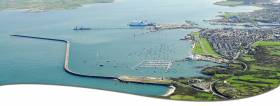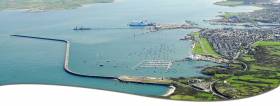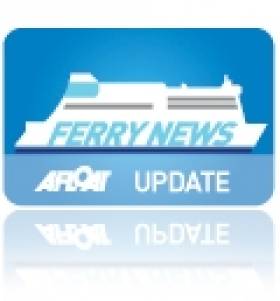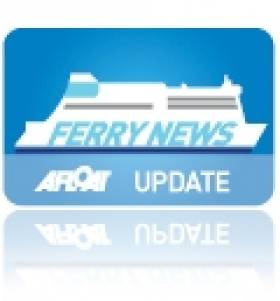Displaying items by tag: Port of Holyhead
Brexit Will Cause Chaos At Holyhead Port, Welsh Assembly Warns
#ferry - Tailbacks and long delays on North Wales roads and disruption to freight supply chains could become the norm without proper planning for ports in Wales following Britain’s exit from the European Union.
As the Daily Post writes, many Welsh ports currently lack the appropriate infrastructure and physical capacity to accommodate new border controls and customs checks that may be requited after Brexit, a new report from the National Assembly’s external affairs committee has found.
The committee also raised concerns that the Cabinet Secretary for the Economy, Ken Skates AM, has been slow to seek meetings with his Irish counterparts and other EU member states on the issue of Welsh ports.
David Rees AM, Chair of the External Affairs and Additional Legislation Committee said: “Welsh ports directly support 18,400 jobs, and many more besides. At the moment, Holyhead and Fishguard both work on the premise of seamless travel from one side of the Irish Sea to the other for goods and people.
For more the newspaper has the story here.
#HardAPort- Michel Barnier, the European Union's chief Brexit negotiator says he wants to avoid a "hard border" between the UK and Ireland, reports the Daily Post.
Fears have been raised that Holyhead port on Anglesey, north Wales could suffer if customs checks are brought back between the Republic and the UK.
Mr Barnier today addressed both houses of the Irish parliament on the issue of Brexit with huge concerns in the Republic, particularly on the issue of the border with Northern Ireland.
Labour's Ynys Mon General Election candidate Albert Owen welcomed the comments and said if re-elected he would create a 'Brexit Forum' on Anglesey to highlight potential issues.
Mr Barnier said: "European integration helped to remove borders that once existed on maps and in minds.
"Brexit changes the external borders of the EU. I will work with you to avoid a hard border.
To read more click here.
Stena Achieves Zero Landfill Target at Port of Holyhead
#Landfill - Stena Line according to Cruise News UK has announced it has achieved its zero landfill target at their Port of Holyhead in Wales.
The company been working closely with Kevin Humphrey’s Waste Recycling Ltd to reach this landmark achievement which means that all waste generated by the Port and its visiting ships has been 100% recycled with nothing being sent to landfill.
Wyn Parry, Stena Line Port Manager at Holyhead commented: “We are delighted that we have achieved our zero landfill target and have made huge progress in our commitment to caring for the environment.
“The Holyhead Port handles approximately 55 tonnes of waste per month so it is very important to us that we deal with it in a responsible way,” Wyn added.
For more on the story, click here.
Ferry ‘Truck Stop’ Facility Opens for Port of Holyhead
#FerryTruckStop – A new 200-space 'truck stop' facility outside the Port of Holyhead costing £6.5m has now opened for business.
The facility approximately 1 mile from the north Wales port on Anglesey, provides a range of much needed facilities for the transport industry.
The truck stop initiative has been developed by Roadking, a company owned by Bet Fred owner Fred Done, and the Conygar investment company. The opening of the truck stop will come on-stream at a time when the port has recorded yet another year of significant growth.
Freight figures for the port continue to rise and Roadking anticipates that the facility will be used by many of the drivers travelling to and from Ireland (Dublin Port) who use Holyhead as their preferred shortest and fastest crossing port.
Afloat adds that 2015 is the first year that all ferry routes and operators are concentrated on the Holyhead-Dublin route since Stena Line withdraw HSS operated services to Dun Laoghaire Harbour in September last year.
The other operator on the short-sea central corridor route is Irish Ferries which likewise of Stena Line operate to the Irish capital but to neighbouring terminals within Dublin Port.
Stena Line to Axe Jobs in Port of Holyhead
#StenaHOLYHEAD – Stena Line which operates the Port of Holyhead, are to axe 21 jobs as part of a majorshake-up.
The ferry firm announced a review across the company's Europe-wide operations in April with up to 50 jobs under threat at Holyhead and Fishguard.
The company confirmed 21 workers faced redundancy and a consultation with staff and unions has started. It is understood 12 are in port handling operations and nine in finance.
Services on the Holyhead-Dublin and Holyhead-Dun Laoghaire routes are not expected to be affected.
For much more on this story, the Daily Post reports.
As previously reported on Afloat.ie, sailings on the seasonal-only operated Dun Laoghaire-Holyhead route ceased earlier this month.
































































